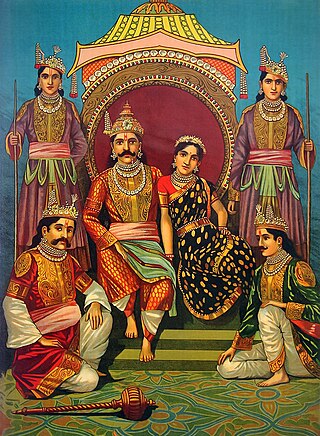Polygamy in India may refer to:
Polygamy in India may refer to:

Polygyny is the most common and accepted form of polygamy around the world, entailing the marriage of a man with several women.

Polyandry is a form of polygamy in which a woman takes two or more husbands at the same time. Polyandry is contrasted with polygyny, involving one male and two or more females. If a marriage involves a plural number of "husbands and wives" participants of each gender, then it can be called polygamy, group or conjoint marriage. In its broadest use, polyandry refers to sexual relations with multiple males within or without marriage.
Polygamy is the practice of marrying multiple spouses. When a man is married to more than one wife at the same time, sociologists call this polygyny. When a woman is married to more than one husband at a time, it is called polyandry. In sociobiology and zoology, researchers use polygamy in a broad sense to mean any form of multiple mating.

Raja Ram Mohan Roy was an Indian reformer who was one of the founders of the Brahmo Sabha in 1828, the precursor of the Brahmo Samaj, a social-religious reform movement in the Indian subcontinent. He was given the title of Raja by Akbar II, the Mughal emperor. His influence was apparent in the fields of politics, public administration, education and religion. He was known for his efforts to abolish the practices of sati and child marriage. Roy is considered to be the "Father of Indian Renaissance" by many historians.

Polygamy was practiced by leaders of the Church of Jesus Christ of Latter-day Saints for more than half of the 19th century, and practiced publicly from 1852 to 1890 by between 20 and 30 percent of Latter-day Saint families.

In cultures where monogamy is mandated, bigamy is the act of entering into a marriage with one person while still legally married to another. A legal or de facto separation of the couple does not alter their marital status as married persons. In the case of a person in the process of divorcing their spouse, that person is taken to be legally married until such time as the divorce becomes final or absolute under the law of the relevant jurisdiction. Bigamy laws do not apply to couples in a de facto or cohabitation relationship, or that enter such relationships when one is legally married. If the prior marriage is for any reason void, the couple is not married, and hence each party is free to marry another without falling foul of the bigamy laws.

Polygamy in the Church of Jesus Christ of Latter Day Saints, or plural marriage, is generally believed to have originated with the founder of Mormonism, Joseph Smith. According to several of his associates, Smith taught that polygamy was a divine commandment and practiced it personally, by some accounts marrying more than 30 women, some of whom had existing marriages to other men. Evidence for Smith's polygamy is provided by the church's "sealing" records, affidavits, letters, journals, and diaries. However, until his death, Smith and the leading church quorums denied that he preached or practiced polygamy. Smith's son Joseph Smith III, his widow Emma Smith, and the Reorganized Church of Jesus Christ of Latter Day Saints challenged the evidence and taught that Joseph Smith had opposed polygamy. They instead claimed that Brigham Young, the head of the Church of Jesus Christ of Latter-day Saints, introduced plural marriage after Smith's death. In 1852, leaders of the Utah-based LDS Church publicly announced the doctrine of polygamy.
Nikah halala, also known as tahleel marriage, is a practice in which a woman, after being divorced by triple talaq, marries another man, consummates the marriage, and gets divorced again in order to be able to remarry her former husband. Nikah means marriage and halala means to make something halal, or permissible. This form of marriage is haram (forbidden) according to the hadith of Islamic prophet Muhammad. Nikah halala is practiced by a small minority of Muslims, mainly in countries that recognise the triple talaq.

Marriage law is the legal requirements, an aspect of family law, that determine the validity of a marriage, and which vary considerably among countries.
The type, functions, and characteristics of marriage vary from culture to culture, and can change over time. In general there are two types: civil marriage and religious marriage, and typically marriages employ a combination of both. Marriages between people of differing religions are called interfaith marriages, while marital conversion, a more controversial concept than interfaith marriage, refers to the religious conversion of one partner to the other's religion for sake of satisfying a religious requirement.
Traditional Sunni and Shia Islamic marital jurisprudence allows Muslim men to be married to multiple women. Men can have up to four wives at a time according to the islamic jurisprudence.
Polygamy in Utah is covered by these articles:

Possibly as early as the 1830s, followers of the Latter Day Saint movement, were practicing the doctrine of polygamy or "plural marriage". After the death of church founder Joseph Smith, the doctrine was officially announced in Utah Territory in 1852 by Mormon leader Brigham Young. The practice was attributed posthumously to Smith and it began among Mormons at large, principally in Utah where the Church of Jesus Christ of Latter-day Saints had relocated after the Illinois Mormon War.
Polygamy is "the practice or custom of having more than one wife or husband at the same time." Polygamy has been practiced by many cultures throughout history.

Joseph Smith, the founder of the Latter Day Saint movement, privately taught and practiced polygamy. After Smith's death in 1844, the church he established splintered into several competing groups. Disagreement over Smith's doctrine of "plural marriage" has been among the primary reasons for multiple church schisms.

Polygamy, including polygyny, is outlawed in India. While it was not prohibited in Ancient India and was common among aristocrats and emperors, it is believed that it was not a major cultural practice. The lack of prohibition was in part due to the separation between land laws and religion, and partially since all of the major religions of India portrayed polygamy in a neutral light. According to some government data polygamy is decreasing day by day in India.

Under civil law, Nigeria does not recognize polygamous unions. However, 12 out of the 36 Nigerian states recognize polygamous marriages as being equivalent to monogamous marriages. All twelve states are governed by Sharia law. The states, which are all northern, include the states of Bauchi, Borno, Gombe, Jigawa, Kaduna, Kano, Katsina, Kebbi, Niger, Sokoto, Yobe, and Zamfara which allows for a man to take more than one wife.

Polyandry in India refers to the practice of polyandry, whereby a woman has two or more husbands at the same time, either historically on the Indian subcontinent or currently in the country of India. An early example can be found in the Hindu epic Mahabharata, in which Draupadi, daughter of the king of Panchala, is married to five brothers.
The legal status of polygamy varies widely around the world. Polygyny is legal in 58 out of nearly 200 sovereign states, the vast majority of them being Muslim-majority countries. Some countries that permit polygamy have restrictions, such as requiring the first wife to give her consent.
Although polygamy is officially illegal in Angola, the practice is known to be widely socially acceptable and very prevalent among the Angolan population. Many women live polygamously due to the shortage of men since the civil war. Angola does not recognize polygamous marriages under civil law or customary law.